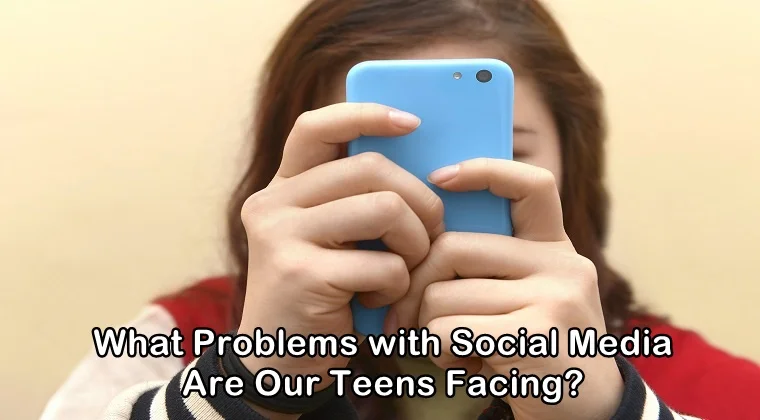What Problems with Social Media Are Our Teens Facing?

Social media has impacted our lives significantly. It is said to be one of the greatest revolutions of technology. While social media helps us connect with people easily, aids communication, provides us with the latest news and happenings all around the world, it has also exposed us to several online risks and challenges, especially our children.
Teens and children are facing several problems with social media despite deriving numerous benefits from this medium. What problems are our teens facing on social media? And what could be done to keep them safe on social networks?
We, as parents, are greatly concerned when it comes to our children’s online safety. With several online threats lurking on social media platforms such as cyberbullying, sexting, pedophilia, stalking, etc., it wouldn’t be wise to let our children spend way too much time in front of their screens.
Most parents are worried about the problems social media is adding to their children’s lives. In this article, we are going to discuss some concerns raised by a mother based in Texas who was worried about teens spending too much time on social media. She could not present any compelling arguments in front of her kids to make them get off the computer.
Troubled, she put forward her concerns and shared them with Dr. Barbara Greenberg, a contributor, and clinical psychologist, who later suggested the mother some concerns and arguments that could put her in a better position to persuade her teens to shut off their computers and spend time somewhere else.
Problems with Social Media for Teens
As explained by Dr. Greenberg in an article published on HuffPost, here are some of the common problems with teens and social media these days:
Lack of Non-Verbal Communication
Dr. Greenberg has stressed that teens and children are losing out on the ability to learn about and read non-verbal cues. They cannot read and understand non-verbal behavior properly if they are spending too much time on the internet.
It is not possible to read someone’s facial expressions and body language if most of teens interacting goes on in the digital world. This is one of the major concerns for parents because their children cannot properly learn to read non-verbal communication during the time they are interacting with others online.
Lack of Cooperation
Another major problem with social media for most teens is that they cannot learn how to cooperate with others especially if they are spending too much time online. They cannot learn how to be a good friend or a good co-worker to someone because cooperation is not the skill that can be learned on the internet.
Teens can learn how to be a good friend to someone if they spend time with them in real life. Only online interaction is not going to make them understand social skills.
Lack of Inclusivity
Social media influences teens and children to be exclusive and cliquey. They want to post and share information about them that proves how unique they are from the rest. In an attempt to show themselves exclusive, they tend to lose the realness of their personalities and try to become someone else. As a result, they lose themselves.
Parents need to make their teens learn to be inclusive rather than exclusive. Unfortunately, social media is not going to provide them with many opportunities to learn to be inclusive in real life. However, they can embrace opportunities to be more inclusive if they spend more time doing other activities.
More Screen Time Less Happiness
Teens and children are addicted to their cellphones these days. They are constantly sitting in front of their screens and browsing through their social media profiles. More screen time can pose them to several health risks such as poor eyesight, poor body posture, and lack of sleep.
It is important that parents need to make their children understand that there is a lot that they can do without staring at a screen. They should limit screen time of their teens so they can learn how to relax and use leisure time somewhere else. An article featured on CNN told us how social media is harming teens’ mental health by disrupting positive activities.
Excessive Drama on Social Media
It is a fact that social media tends to create excessive drama. A simple message on social media is blown out of proportion and becomes viral within seconds. This happens because positive messages are seen as more neutral than they are intended to be. On the other hand, neutral messages are seen as more negative than they are intended to be. Now you can imagine what would happen with messages that are intended to be negative.
Parents can ask their children to stay away from unnecessary drama on social media. They should not participate in irrelevant debates and also avoid trolling others.
Sleep Deprivation
Teens use social media until the wee hours of the night and keep staring at their teens, tiring out themselves in the process. They text their friends, watch videos, and play games until late at night. Spending too much time in front of their screen late at night can disturb their sleep patterns.
Children who are already sleep-deprived become more sleep-deprived because of spending too much time on social media until late night texting and browsing. Parents should make it a point to stop their children from using their cellphones at night. Perri Klass, M.D., explained when social media becomes problematic for adolescents in a post featured in NYTimes.
Absent-Mindedness
It is seen that teens tend to become absent-minded when they are using their smartphones. They lose the ability to interact mindfully with others in the moment. The same happens with most adults. Even they do not interact mindfully with others because they are too much occupied with their cellphones.
This absent-mindedness on the part of teens and adults is quite upsetting. It is better to make teens understand that they need to learn to be present in the moment without getting lost in the world of social media via cellphones.
Negative Feelings
Teens tend to become more violent and sexual when they feel they can’t be identified on social media and are communicating with others in the digital world. They engage in sexual behavior online through sexting and bully others by sending them mean and abusive messages.
Parents must be aware of how things can get out of hand very quickly for teens when they are interacting in the virtual world. They should teach them how to use social media responsibly and wisely.








